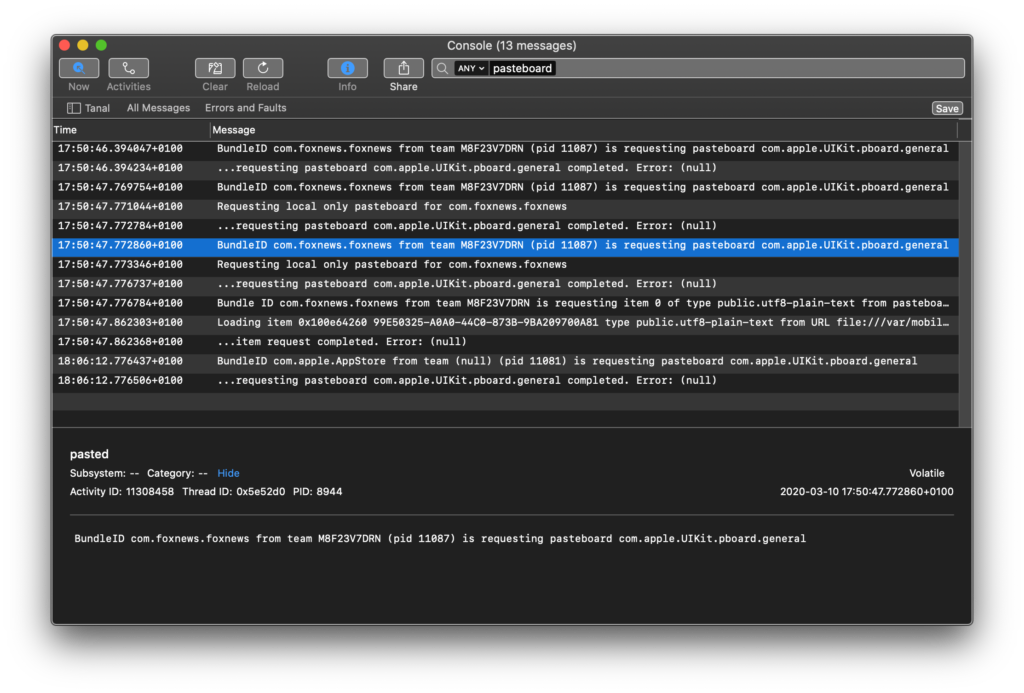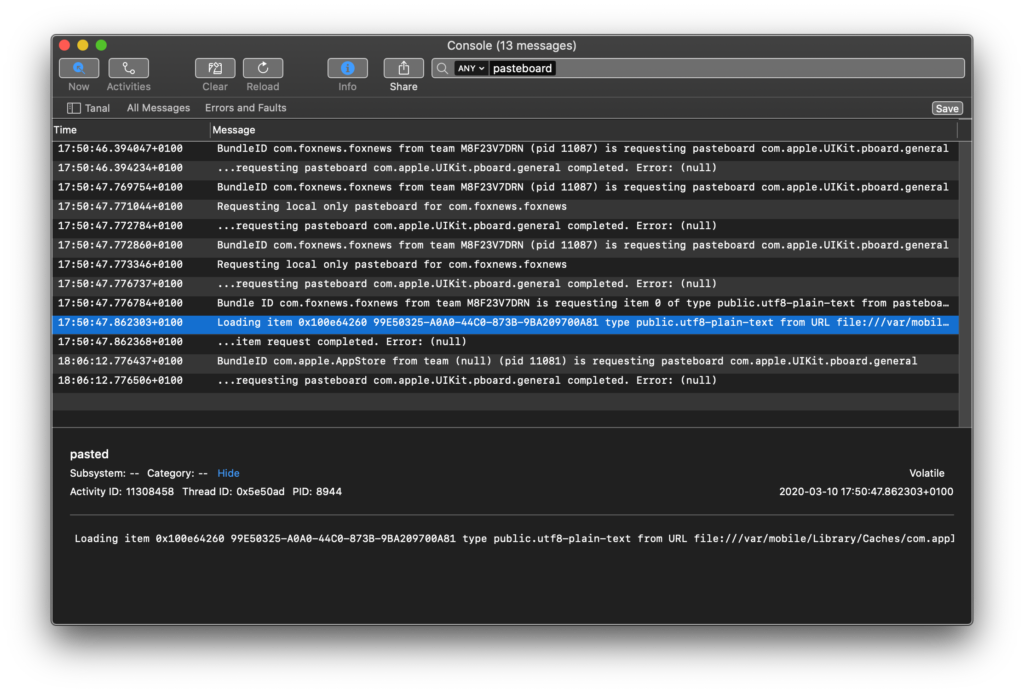Popular iPhone and iPad Apps Snooping on the Pasteboard | Mysk
By Talal Haj Bakry and Tommy Mysk
If you enjoyed this work, you can support us by checking out our apps:
Videos
- Two apps; one snoops on the clipboard, the other doesn’t
- Method to view pasteboard events using Xcode
Summary
This article provides an investigation of some popular apps that frequently access the pasteboard without user consent. These apps range from popular games and social networking apps, to news apps of major news organizations. We found that many apps quietly read any text found in the pasteboard every time the app is opened. Text left in the pasteboard could be as simple as a shopping list, or could be something more sensitive: passwords, account numbers, etc.
Introduction
Apps on iOS and iPadOS have unrestricted access to the system-wide general pasteboard, also referred to as the clipboard. The potential security risks of this vulnerability have been thoroughly discussed in a previous article: Precise Location Information Leaking Through System Pasteboard. We have explored popular and top apps available on the App Store and observed their behaviour using the standard Apple development tools. The results show that many apps frequently access the pasteboard and read its content without user consent, albeit only text-based data.
The apps we chose in this investigation belong to various App Store categories, e.g. games, social networking, and news. As we described in our pervious article, the severity of the pasteboard vulnerability is greatest when popular and frequently-used apps exploit it. Thus, we targeted a variety of popular apps we found on the top lists of the App Store.
Methodology
Apple provides Xcode and Xcode Command Line tools for developers to build apps for iOS, iPadOS, and macOS. We used these official tools to monitor and analyze the behavior of apps installed on our iOS and iPadOS devices. The method is simple: Once we connect and pair the devices with Xcode, we can read the system log of the device. Fortunately, all pasteboard events are clearly logged. Figure 1 shows an example of the system log output when the Fox News app is opened. The following explains the key information in the log output:
- The logs output all events, and is filtered by the keyword “pasteboard”
- The highlighted event in Figure 1 shows when the Fox News app requested access to the pasteboard with ID com.apple.UIKit.pboard.general. This is the ID of the system-wide pasteboard
- BundleID com.foxnews.foxnews is the ID that uniquely identifies the Fox News app on the App Store
- The event message that starts with “Loading item …” in Figure 2, indicates that the app has read the content of the pasteboard.
- The type public.utf8-plain-text indicates that the content that the app has read is text.
This method can be performed by any iOS or Mac developer.
 Figure 1
Figure 1
 Figure 2
Figure 2
Criteria
We include any app that requests and reads the content of the system-wide pasteboard every time it’s opened, and consider it to be highly suspicious. There are games and apps that do not provide any UI that deals with text, yet they read the text content of the pasteboard every time they’re opened.
Every app that is popular or on a top list according to the App Store rankings qualifies to be part of this investigation. However, we picked a diverse collection of apps to provide proof that such a suspicious practice of snooping on the pasteboard exists in many apps.
There is a considerable number of apps that only read the content of the pasteboard on launch. That is, the app reads the pasteboard only when it is opened for the first time. The next time it reads the pasteboard again is when the app is quit and relaunched. Although such a behavior is also suspicious, we decided to exclude such apps and focus on the ones that access the pasteboard more frequently.
As noted in our previous article, an app that accesses the pasteboard can also read what has been copied on a Mac if Universal Clipboard is enabled.
Findings
While unrestricted access to the pasteboard allow apps to read any data type, all the apps we investigated for this article have only requested access to text data. In other words, they are only interested in reading text and ignore other data types that may have been copied to the pasteboard, such as photos and PDF documents. Surprisingly, none of the widgets that were tested accessed the pasteboard.
Our findings only documented apps that read the pasteboard every time the app is opened. However, apps can delay snooping on the pasteboard until some time or event takes places (e.g. signing up), hence are not included in our findings.
List of Apps
This section summarizes the list of apps that snoop on the pasteboard every time the app is opened. The apps are listed alphabetically in the following format:
- App Name — BundleID
News
- ABC News — com.abcnews.ABCNews
- Al Jazeera English — ajenglishiphone
- CBC News — ca.cbc.CBCNews
- CBS News — com.H443NM7F8H.CBSNews
- CNBC — com.nbcuni.cnbc.cnbcrtipad
- Fox News — com.foxnews.foxnews
- News Break — com.particlenews.newsbreak
- New York Times — com.nytimes.NYTimes
- NPR — org.npr.nprnews
- ntv Nachrichten — de.n-tv.n-tvmobil
- Reuters — com.thomsonreuters.Reuters
- Russia Today — com.rt.RTNewsEnglish
- Stern Nachrichten — de.grunerundjahr.sternneu
- The Economist — com.economist.lamarr
- The Huffington Post — com.huffingtonpost.HuffingtonPost
- The Wall Street Journal — com.dowjones.WSJ.ipad
- Vice News — com.vice.news.VICE-News
Games
- 8 Ball Pool™ — com.miniclip.8ballpoolmult
- AMAZE!!! — com.amaze.game
- Bejeweled — com.ea.ios.bejeweledskies
- Block Puzzle — Game.BlockPuzzle
- Classic Bejeweled — com.popcap.ios.Bej3
- Classic Bejeweled HD — com.popcap.ios.Bej3HD
- FlipTheGun — com.playgendary.flipgun
- Fruit Ninja — com.halfbrick.FruitNinjaLite
- Golfmasters — com.playgendary.sportmasterstwo
- Letter Soup — com.candywriter.apollo7
- Love Nikki — com.elex.nikki
- My Emma — com.crazylabs.myemma
- Plants vs. Zombies™ Heroes — com.ea.ios.pvzheroes
- Pooking – Billiards City — com.pool.club.billiards.city
- PUBG Mobile — com.tencent.ig
- Tomb of the Mask — com.happymagenta.fromcore
- Tomb of the Mask: Color — com.happymagenta.totm2
- Total Party Kill — com.adventureislands.totalpartykill
- Watermarbling — com.hydro.dipping
Social Networking
- TikTok — com.zhiliaoapp.musically
- ToTalk — totalk.gofeiyu.com
- Tok — com.SimpleDate.Tok
- Truecaller — com.truesoftware.TrueCallerOther
- Viber — com.viber
- Weibo — com.sina.weibo
- Zoosk — com.zoosk.Zoosk
Other
- 10% Happier: Meditation —com.changecollective.tenpercenthappier
- 5-0 Radio Police Scanner — com.smartestapple.50radiofree
- Accuweather — com.yourcompany.TestWithCustomTabs
- AliExpress Shopping App — com.alibaba.iAliexpress
- Bed Bath & Beyond — com.digby.bedbathbeyond
- Dazn — com.dazn.theApp
- Hotels.com — com.hotels.HotelsNearMe
- Hotel Tonight — com.hoteltonight.prod
- Overstock — com.overstock.app
- Pigment – Adult Coloring Book — com.pixite.pigment
- Recolor Coloring Book to Color — com.sumoing.ReColor
- Sky Ticket — de.sky.skyonline
- The Weather Network — com.theweathernetwork.weathereyeiphone
Conclusion
Access to the pasteboard in iOS and iPadOS requires no app permission as of iOS 13.3. While the pasteboard provides the ease of sharing data between various apps, it poses a risk of exposing private and personal data to suspicious apps. We have investigated many popular apps in the App Store and found that they frequently access the pasteboard without the user being aware. Our investigation confirms that many popular apps read the text content of the pasteboard. However, it is not clear what the apps do with the data. To prevent apps from exploiting the pasteboard, Apple must act.